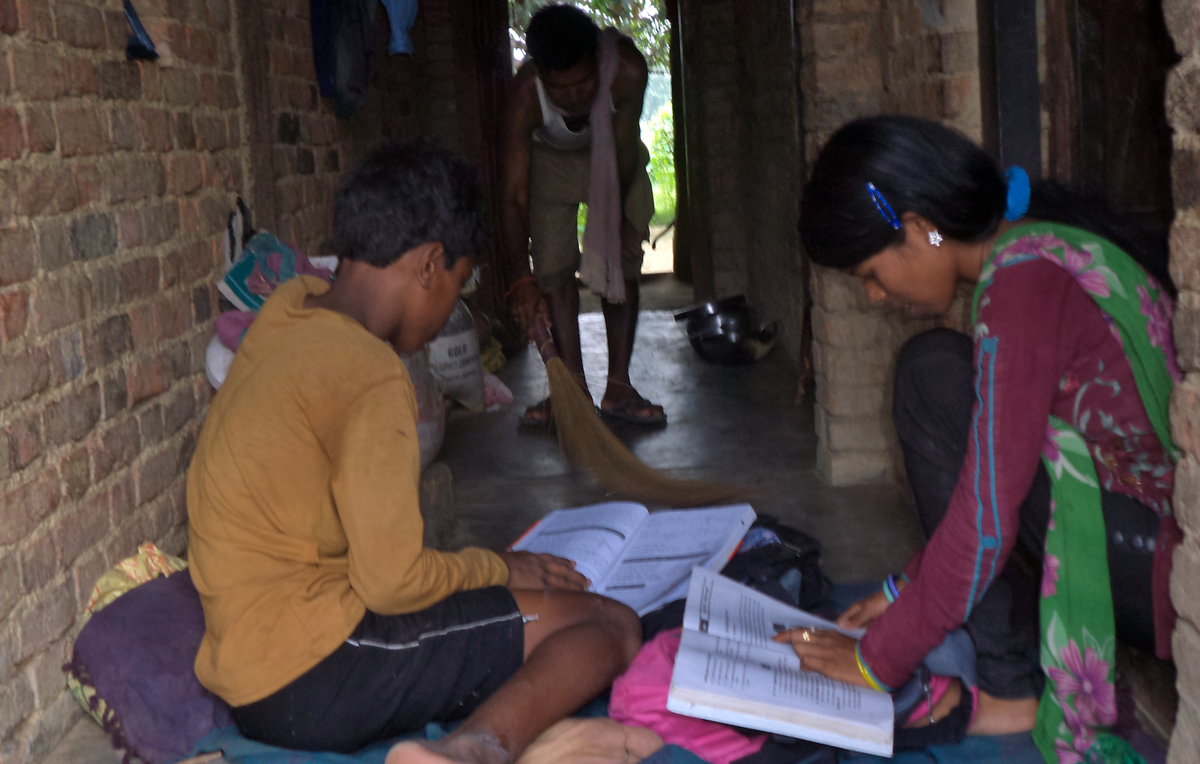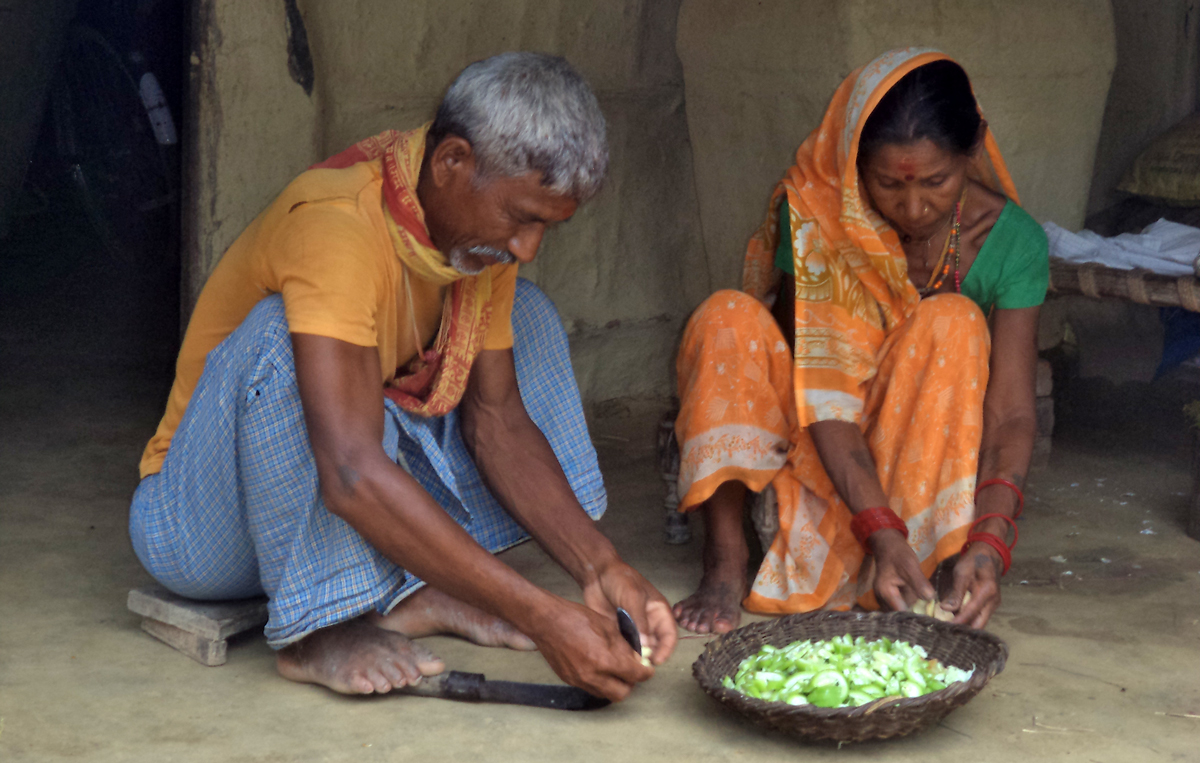Guest post from our Steering Committee member Save the Children on the Fatherhood Project in Nepal

Ram Kumar Tharu, 44 years old, is a single father in Nepal. He lives with his daughter, son, and elderly mother in a rural village in Buddhi Village, in the Kapilvastu District. He is a farmer, and he also recently opened a small grocery shop.
Ram Kumar used to not care about the wishes and dreams of his wife and children. He was never involved in the household work, which he thought was only for women. He used violence against others and at home, and his neighbors were often forced to intervene and stop his violent behavior against his family.
Two and a half years ago Ram Kumar lost his wife. He had hardly entered the kitchen before that, and he had never cooked any food. He never sat down and listened to his children – especially not his daughter – about what support they needed from their father.
One day a community worker came and spoke to Ram Kumar about a new initiative in their village that offered support to fathers. The initiative worked with men to be “better fathers” and to create healthier relationships with their children, wives, and other family members. At first he was not interested, but when the social worker asked him if he wanted to develop a positive relationship with his children, he realized that his children had become distant from him and also violent. He therefore decided to join the local fathers’ group in his village.
Ram Kumar explained that the results of his participation in the fathers’ groups were dramatic:
“The Fatherhood Project helped me to understand the value of gender equality and the importance of a man’s participation in household activities.”
“The Fatherhood Project helped me to understand the value of gender equality and the importance of a man’s participation in household activities. It encouraged me to take care of my family and children. I started to learn how to cook with my mother, and I learned many household chores from my daughter, too. Now, I can take care of myself and the house. I don’t need to ask my neighbor to cook food when my mother can’t do it. I can do it myself.”
Ram Kumar’s neighbors have also seen a drastic change in his behavior. According to one neighbor:
“We encourage our sons and husbands to be like him, to help their family members with the household work, and to take care of their children and mothers.”
“He doesn’t drink and make noises anymore. He has become a good example for our neighborhood. We encourage our sons and husbands to be like him, to help their family members with the household work, and to take care of their children and mothers. He is very different now from the way that he was before, and from most of the other men. He is active at home and in the community. He spends his time helping family and community members rather than strolling around the village.”
Stories of Change from Fatherhood Project Participants:

“Now my attitudes toward my daughter and son have changed. Because our society is a bit backward about these things, [my peers] tease me for changing my attitude about gender equality. But I don’t care, as I know it will ultimately bring peace and prosperity to the family.” – Ram Kumar, Father, Buddhi Village
“After joining the Fatherhood Project, I learned that my beliefs about gender issues and what it means to ‘be a man’ were all wrong. I regret my decisions made in the past.” – Grandfather, Hariharpur Village
“I have started discussing these issues with my sons, including the importance of our granddaughters’ studies and not having them marry early. I clearly tell them that our granddaughters should be allowed to study and pursue the careers that they wish to. It was difficult for [my sons] to understand my position at first. But, I tried to help them understand the things I learned at the fathers’ group. Now, they have slowly begun to understand me.” – Grandfather, Hariharpur Village
About the Fatherhood Project:
With the primary objective of developing further evidence on what works to engage fathers and male caregivers in gender-sensitive, equitable, and nonviolent parenting, Save the Children and its partner SunShine Social Development Organization (SSDO) started a pilot project in 14 rural villages in the Kapilvastu District in June 2013. The project aims to empower local communities, engaging fathers and male caregivers in active, gender-sensitive, nonviolent ways in the lives of their children, partners, and other female family members. It also works to enhance men’s equitable involvement in care and domestic work at the family level.
As part of the project, Save the Children, SSDO, and community fathers’ group facilitators developed a manual entitled Engaging Fathers in Child Care and Gender Equality. This manual includes sessions on children’s rights, healthy relationships, positive parenting, gender equality, and prevention of violence against women and children. These sessions are tailored to facilitate greater understanding about inequitable gender norms and values, thereby questioning and transforming existing inequitable attitudes and behaviors among the participants. Between the sessions, fathers’ group members are given the space and time to reflect on – and put into practice – lessons learned with their children and partners at home.
Based on the positive feedback from participants in the pilot, the Fatherhood Project developed four fathers’ group networks in Nepal, each with more than 100 members. These networks develop their own action plans to engage men and boys in their communities, to raise awareness about ending violence against women and children, and to speak out against domestic violence. They also work to prevent early and forced marriage. One of the core messages that these networks promote is: “Men and boys should be involved in the household and in the unpaid care work, and they should be aware of the father’s role as a caregiver.”
For further information, contact:
Laxman Belbase | laxman.belbase@rb.se
Thematic Advisor on Gender Equality & Health
Save the Children